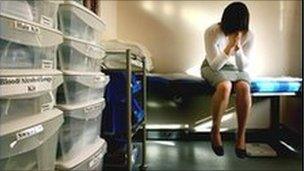Shortage of rape medics 'hampering convictions'
- Published

Doctors are concerned about the shortage of specialist rape medics
A lack of specialist medics to care for rape victims could be hampering conviction rates, doctors believe.
Sexual offence examiners are linked to police forces and can play a vital role in collecting evidence for court cases.
But the British Medical Association said too many forces did not have them or did not use properly trained medics.
Police chiefs agreed the service could be improved. Just 6% of rape complaints to police lead to a conviction for rape, according to official figures.
The warning comes after a review, by crossbench peer Baroness Stern, recommended an overhaul in the care and support given to rape victims.
It said funding for the examiners should be transferrred from the police to the NHS to ensure more consistent services.
At the moment forces that do have them use medics from a variety of sources, such as the NHS, private firms and those working on an individual basis.
'Shocking'
Dr Richard Lewis, who heads up the Welsh arm of the BMA and is qualified in forensic medicine, said the situation was partly responsible for the "shocking" low level of convictions.
"We know that there is no quick fix, but there are positive measures that can be taken."
The Stern review reported that just 6% of rape complaints to police led to a conviction for rape, with a further 6% leading to related convictions.
But of the allegations that reach court, almost 60% end up with a conviction.
Chief constable Dave Whatton, from the Association of Chief Police Officers (Acpo), said despite the problems there was still "good work already being carried out".
He said Acpo was waiting for the government response to the Baroness Stern review, but added there were "real opportunities" to make the system better.
The government is expected to respond to the Stern recommendations soon.